10. ENLIGHTENMENT ... AND REVOLUTION

"REVOLUTION"
CONTENTS
 The American "Revolution" The American "Revolution"
(1770s-1880s)
 The French Revolution (Mid-1770s to the The French Revolution (Mid-1770s to the
Early 1780s)
 Napoleon Bonaparte Napoleon Bonaparte
 The American and French Revolutions The American and French Revolutions
compared
The textual material on page below is drawn directly from my work
A Moral History of Western Society © 2024, Volume One, pages 401-415.
THE AMERICAN "REVOLUTION"
(Mid-1770s to the Early 1780s) |
|
The monarchical principle in trouble
When Prussia's popular King Frederick II (the Great) blocked an
Austrian attempt to retake Silesia with his own surprise attack on
Austria's ally, Saxony – and then treated high-handedly the
Polish-Saxon royal family (directly connected to Louis XV of France) in
their defeat – European nobility (and even French commoners) were
outraged. This was not how royalty were to be treated.
But in fact, royal absolutism was beginning to slip. Questions
were now being raised on the European continent about the divine rights
of kings. As humanist rationalism blossomed among Europe's
intellectuals and aristocrats, the very idea of God-given authority
certainly found itself losing its compelling qualities. If divine
rights lost its grip on the minds and hearts of Europeans, what then,
morally speaking, justified all this royal absolutism?
Indeed, the Enlightenment had unleashed all sorts of philosophical
conversations about reforming European governments in order to make
them more rational, more "enlightened." The debacle of the French
role in the Seven Years' War, plus the shocking state of the French
king's finances, plus rumors about the king's mistress, Madame de
Pompadour, and her role in the rapid turnover of the King's advisors,
all became topics of conversation by intellectuals and noblemen (female
as well as male) who gathered in the "salons" of fashionable French
homes to discuss the decaying state of French society. But the
conversations could also be heard in the streets of Paris by commoners,
who raised many of the same questions.
George III's royalist absolutism
During the course of the recent war George II died (1760) and his place
was taken by his 22-year-old grandson George III. However this
George was not a German ... but was fully English (he never even
visited his estates in Hanover). He was very well educated or
"Enlightened" in his youth ... and was tightly disciplined by his
mother, who took the responsibility of making sure that her son would
some day be every bit the absolutist king (that the first two Georges
were not!) that the Bourbon family of France modeled for the rest of
Europe's royalty.
For the American colonies, who under the first two Georges had been
left largely alone to conduct their own political and economic affairs,
George III's efforts to live up to his mother's expectations of him as
an absolutist king would soon enough fuel the fires of full rebellion.
Taxation without representation
Because of the Seven-Years' War, George III's debt had nearly doubled
in size and he needed new taxes to replenish his royal treasury.
His thinking was that the colonies had benefitted from his military
action in America and therefore they should pay up ... without
considering that they had carried much of the burden of the action
themselves without compensation. Worse he simply imposed new
taxes without first consulting the colonial tax payers themselves – in
direct violation of an ancient right of all Englishmen to be consulted
first. The Whigs in the English Parliament were sympathetic to
the colonials when they began to object loudly; the Tories however
supported the King's rather autocratic move. And at this point
George was relying principally to his Tory supporters.
Growing conflict
Also, the King began to take the attitude that the colonials were far
too independent-minded and needed in principle to be shown who now was
in charge (unlike his immediate predecessors). Thus the King sent
soldiers to America to protect the tax collectors ... to which the
citizens of Boston reacted by dumping tea into the Boston harbor
(1773).3 George countered (1774) by shutting down the port of
Boston and forcing their citizens to house the often unruly soldiers
... to break their spirit. Then he moved to make good on his
promise to France to outlaw the further expansion of colonial
settlements westward so that the Catholic French could place their own
settlements there. Also there were the rumors that he was going
to bring the independent congregations of Protestant America under
episcopal authority (rule by bishops) ... and thus under his direct
control as head of the English Church.
War
Finally war started (1775) when he sent his troops by night to seize
the gunpowder stored in Concord ... producing actual s
hooting on both
sides (which the British received the worst of). When colonial
troops then gathered in the heights above Boston the English
counterattacked and finally after much loss of life (twice the numbers
on the British side) the colonials withdrew ... returning that winter
but this time with cannon in the heights around British-held
Boston. The British then wisely vacated Boston ... never to
return.
That next summer (1776) the colonials made formal what was clearly
evident in their behavior: they considered themselves a fully
independent people. It was a daring move. The Dutch had
performed this same feat ... but it had taken them some 80 years
(1568-1648) of agonizing war to carry off their own independence.
The colonials were considered in comparison to the sophisticated Dutch
a rather boorish people. The English expected the crushing of
this rebellion to be short work. Other Europeans stood by
wondering.
The French join the action
But the wondering ceased when in 1777 the colonials destroyed a British
army of 6,000 men at Saratoga. France now joined the war on the
American side ... the recently crowned French King Louis XVI more than
happy to make whatever trouble he could for British King George III.
The impact on French thinking
Thus the new conflict began to take shape the way dynastic conflict
typically did ... except that Louis had no idea of what he was getting
involved with. The idea of a subject people rising in rebellion
against their king was not a principle he should have been supporting
... no matter how much trouble it brought France's traditional royal
enemy England. His soldiers who served in America would certainly
become infected with the idea that the people had political rights of
their own ... and that it was okay for them to break free from their
sovereign king when they possessed the moral right to do so.
Considering that the Enlightenment conversations in the French salons
were already bringing up such questions as the right and wrong of
politics, the American rebellion was likely to prove toxic to French
politics. And indeed it did.
American victory
With key French help in the huge British defeat at Yorktown (1781), the
colonials finally broke the last of the English will to continue the
conflict ... and the English sued for peace. The Americans had
done it ... secured their independence from royal rule in basically
five (but very hard) years!
 For more (much more) on America's War of Independence For more (much more) on America's War of Independence
3Actually
the reaction was not only about taxes but also about the fact that the
King was subsidizing the earnings of the struggling British East India
Company ... forcing the colonies to buy their tea when in fact Dutch
tea was much cheaper.
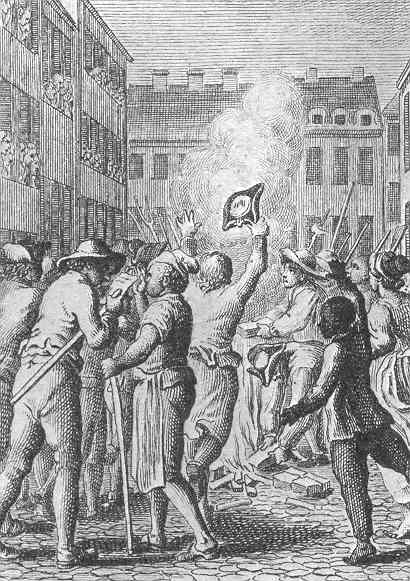 Bostonians reacting to the
Stamp Tax
Bostonians reacting to the
Stamp Tax
Library of
Congres
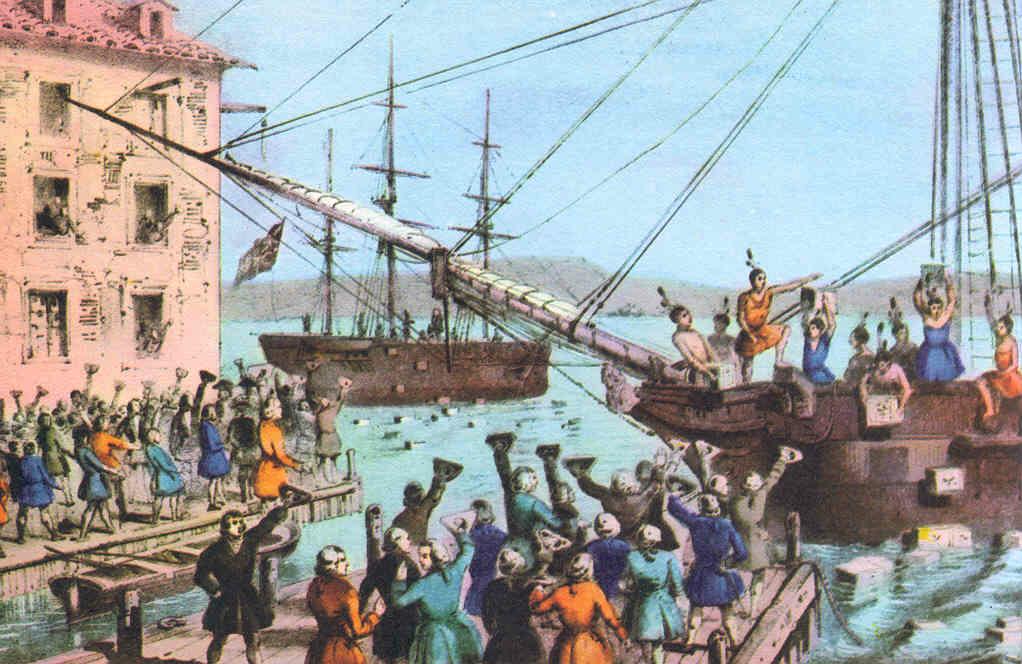 The Boston Tea Party - December
16, 1773
The Boston Tea Party - December
16, 1773
(actually a night-time
caper!)
Museum of the City of New
York
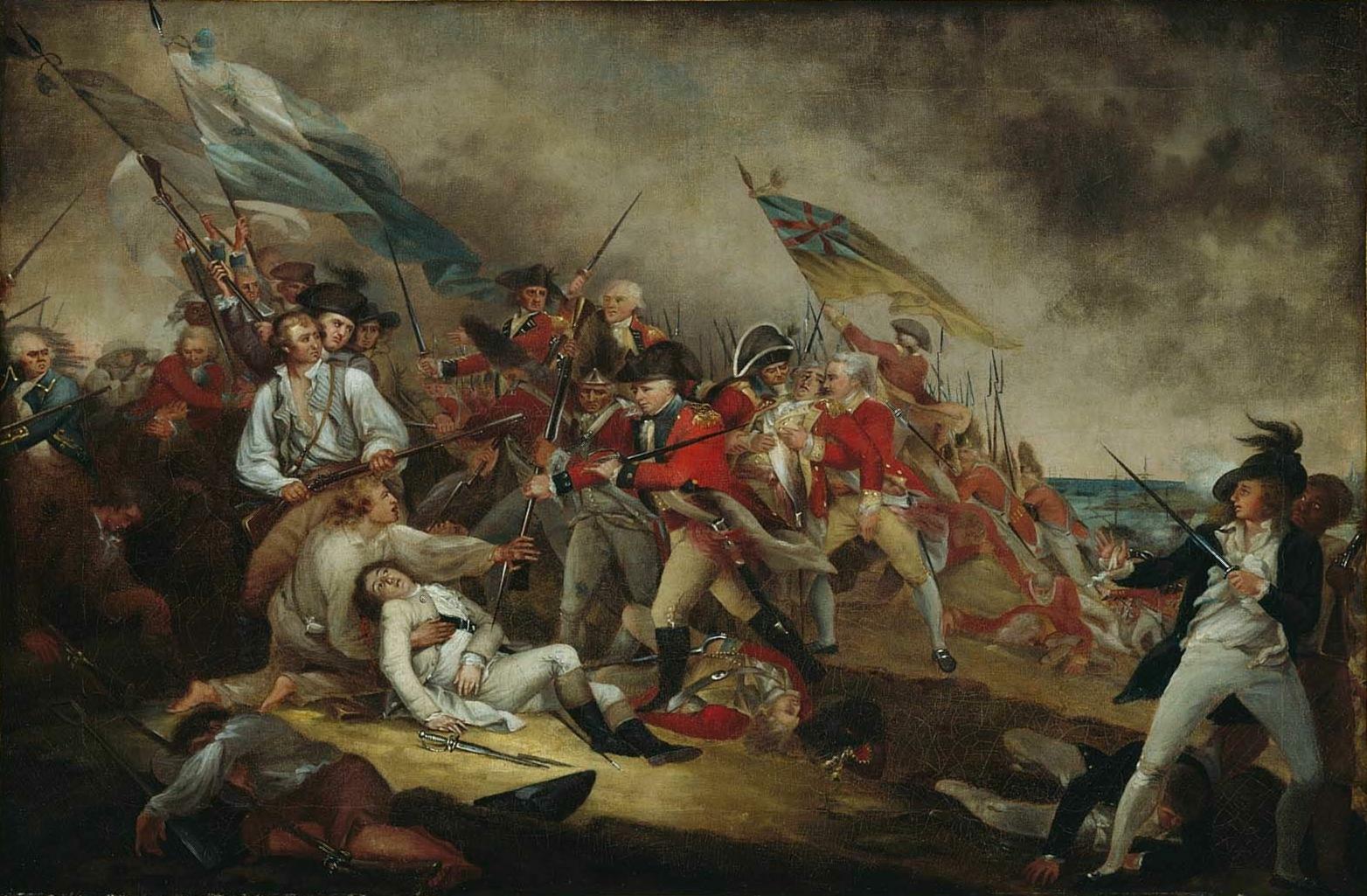
The Death of General Warren
at the Battle of Bunker Hill (Breed's Hill) - June 1775 -
by John Trumbull
Museum of Fine Arts,
Boston
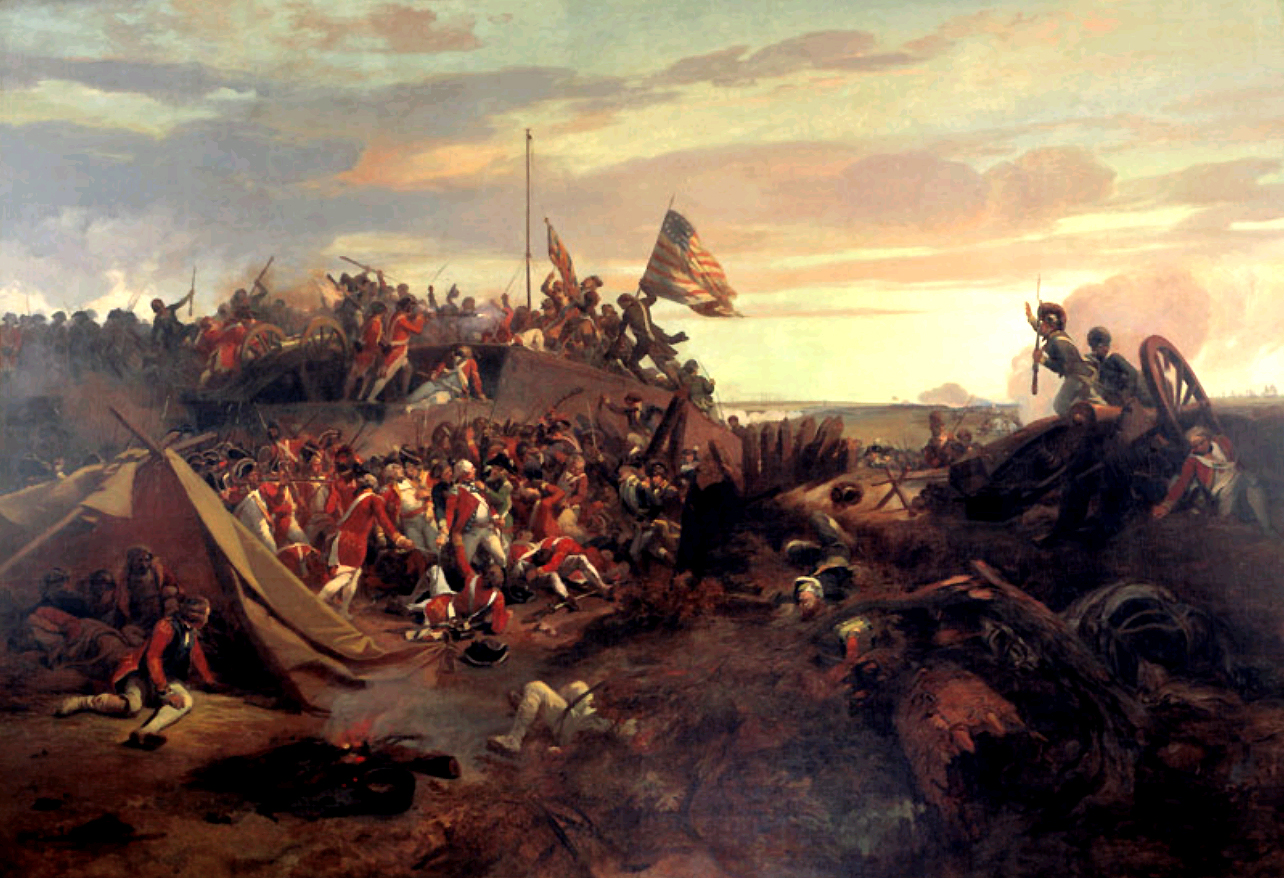
Alexander Hamilton's American
Troops overrun the English Redoubt-10 at Yorktown
- October 14, 1781
Virginia State
Capitol
|
The uniting of the thirteen new states as a federation
In
coming together to fight George III's aggressions, the inhabitants of
the English colonies in America had certainly thought of themselves
quite seriously as "Americans." Otherwise they still typically
saw themselves as Georgians, Virginians, New Yorkers, etc.
Thus when the English armies were finally sent back to England at war's
end, they proceeded to look to the development of their former colonies
as newly independent states, Massachusetts, Pennsylvania, New Jersey,
Virginia, South Carolina, etc. Despite a continuance of the
Confederation that had held them together during the recent war, the
lack of a continuing common cause had demonstrated the weaknesses built
into this union. Thus they were beginning to compete diplomatically and
economically with each other in their ongoing relations with the Old
World of Europe. They were even erecting trade barriers against
each other's products in the hope of encouraging the development of the
industry and commerce of their particular state.
Those who had given so much of themselves during the war now grew
alarmed at where this new narrow view of patriotism was taking them.
Not only was this hurting the Americans financially, but their disunity
could give opportunity to one of the major European powers (Spain,
France or even England) to come and force them back into colonial
status.4
Particularly now choosing to work independently of each other, any one
of these small states would be an easy pickoff by the more powerful
European monarchs.
Thus delegates from twelve states (Rhode Island refused to
participate) gathered in Philadelphia in the summer of 1787 to put
together some kind of a stronger constitutional union that would face
them outward in common defense ... and inward with an agreement to do
away with these trade barriers they had been erecting.
But many were suspicious of a central power (they had just fought off
the power of the English King and Parliament) and would come to support
the idea of a union only under the promise of a number of guarantees
that this federal union would not compromise the powers of the states
... and the people themselves. Thus a promise was made to add a Bill
of Rights to the Constitution as soon as it was ratified and a new
government formed under its provisions.
The Constitution itself provided for a system of power distribution
that would use the natural human tendency of those in power to want to
accumulate even more power ... to have that tendency offset by other
parts of the governing system acting in the same way. This system was
well recognized at the time (thanks to the writings of the French
political philosopher Montesquieu who had studied carefully the
mechanics of the British government) and was termed the
"checks-and-balances" system. Law-making powers were assigned to a
Congress of two Houses, a Senate representing the States and a House of
Representatives representing the citizen voters. But the legislative
powers of Congress were carefully limited to only those outlined in the
Constitution itself. A President was designated as the chief executive
officer (and head of the military and the diplomatic corps) whose job
was to oversee the implementation of the laws made by Congress. And a
federal judiciary was designated to try cases coming under
constitutional law. All other powers, most particularly the laws that
guided the daily affairs of the American people were (by the Bill of
Rights) reserved to the States ... and to the people themselves. Thus
the Constitution provided for a limited government to protect the unity
of the individual states ... and little more than that lest it should
want to take upon itself ever wider powers. It was understood that
sovereignty remained with the people and the states.
Whether or not this system would continue to work as originally
intended would ultimately depend on the people themselves. The
historical record for popular vigilance in this regard was not good.
Thus when Benjamin Franklin was asked at the end of the meetings that
had been held in secret as to what kind of government they had come up
with his answer was: "a Republic ... if you can keep it."5
 For more (much more) on The Birth of the American Republic For more (much more) on The Birth of the American Republic
4Treaties
in those days were indications only of a pause in a conflict ... not
its resolution. Treaties were made and unmade in rapid
succession. Thus the Treaty of Paris recognizing American
independence by the British could be broken at any time the British
noticed a weakness among any of the American states.
5Note: of critical importance.
Keeping those powers separate and not having them come – by human
instinct itself – into the hands of a smaller and more powerful group
of authorities has been very difficult, even in America, where the
national authority has slowly stripped state and local authorities of
much their power, where federal judicial authority (most notably the
Supreme Court) has taken on greater legislative powers than Congress,
and where the president employs executive power solely in accordance
with his own personal tastes … and through extensive bureaucratic
control of the nation's life – control that Congress seems unable (or
unwilling) to check.
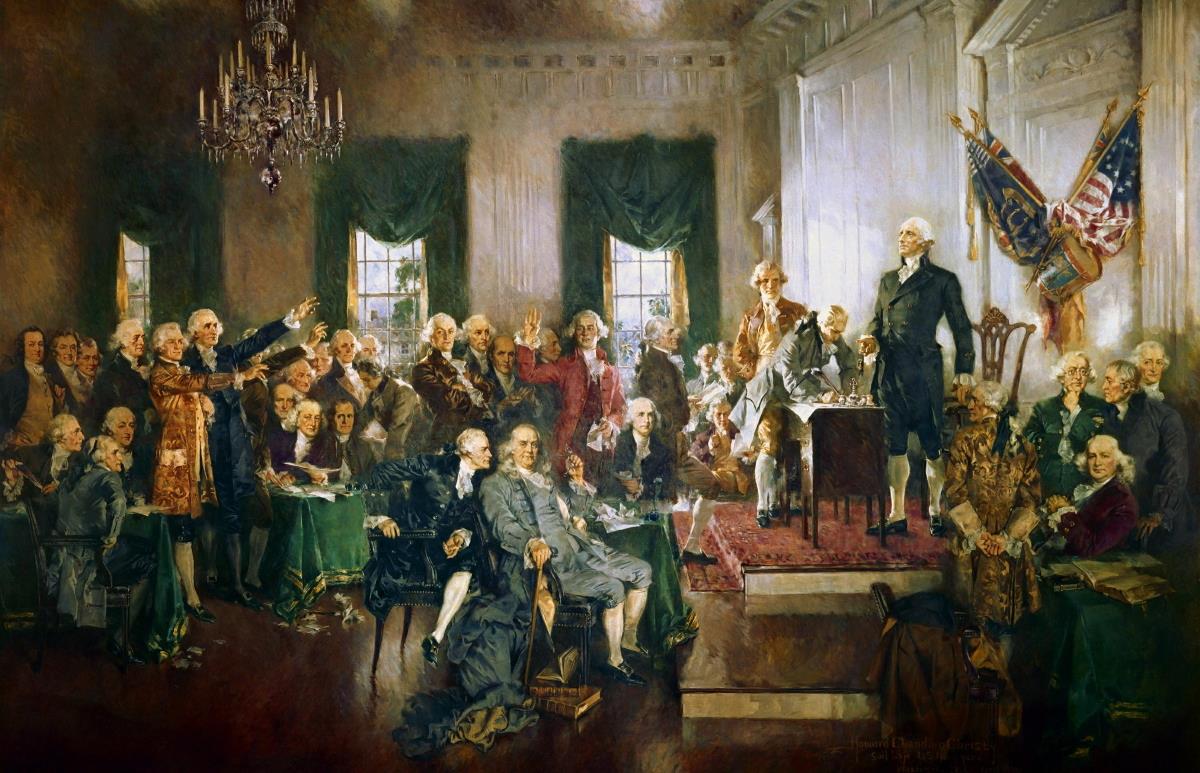
Signing the Constitution
of the United States - by Howard Chandler Christy
Architect of the Capitol
THE FRENCH REVOLUTION (1789-1799) |
|
Supporting
the war in America of course had only worsened the situation for the
French royal treasury (once again!). Taxes would have to be
raised. And because both the Church and the nobility were
exempted from taxation, this would all fall on the French tax-paying
commoners (the moneyed middle class), who were already heavily burdened
with taxes. Discussions about revising the tax system led
nowhere. Eventually the discussion moved to the idea of taxing
the nobility ... gaining opposition from that quarter... but merely
highlighting all the more the privileges of the nobility versus the
burdens of the commoners. At this point (May 1789) Louis XVI was
forced to turn to the Estates-General (a French National Assembly
representing all three estates of: church, nobility and
commoners). Because of the practice of royal absolutism, this
august body had not been convened by a French king since 1614.
With this call to assemble, French politics exploded.
It was apparent from the beginning that the Third Estate (commoners)
was going to dominate the proceedings ... and had a number of economic
and political reforms they were demanding to be put in place or they
would not be willing to cooperate with the King. Seeing the
calling of the Estates-General as a mistake, Louis then tried to shut
down the assembly (June), only to have the members of the Third Estate
move to a nearby tennis court, and there swear an oath to not leave
until a new constitution was granted by the king.6
Indecisive behavior by the King, the arrival of troops to Paris, and
all sorts of rumors circulating around the streets of Paris, set
off rioting and looting culminating in the storming of the Bastille
castle (July) and the complete breakdown of royal authority when the
King's troops began to side with the Paris mob of sans culottes
(workers who wore trousers rather than knee-length silk breeches or
culottes).
At this point the Third Estate was now meeting as the "National
Constituent Assembly," working on a new Constitution for France, which
included the ending of all the privileges of the Church and the
nobility. Frenchmen of all classes now stood equally before the
law, stated clearly in the new Declaration of the Rights of Man (August). In one stroke, French feudalism had come to an end.
Some
noblemen were willing to go along with the new France. But many
(émigrés) showed their opposition by fleeing to other countries ... and
appealing to the rest of European nobility to form a counter-revolution
in order to restore the nobility's ancient feudal rights in
France. This merely put all the nobility (and upper-level Church
authority) in the eyes of the new French "citizen" under suspicion of
treason.
Then when the King himself attempted to escape France (June 1791) and
was caught at the border, he was returned to Paris now also under
similar suspicion.
The target of reform was not only the old royal-feudal structure of
France but also the Church organization that had long supplied it its
legitimacy. Church property was turned over to the Assembly,
which then sold the land in order to raise needed revenues.
Clergy now became civil employees paid by the State, required to swear
loyalty to the State rather than the Pope. Most clergy refused
and were treated as traitors.
The Constitution was finally approved in September of 1791, providing
for a constitutional monarchy: a single legislative body
(basically the National Assembly), a monarch with limited veto powers,
and an independent judiciary. But it was short-lived ... as the
King used his remaining powers to protect priests who had refused the
oath of loyalty to France rather than the Pope. He was also
accused of showing little interest in organizing a national army to
protect France from the larger reaction against the Revolution by the
surrounding powers. Thus when French action against the
Austrians and then the Prussians proved dispirited and unsuccessful,
the blame fell on the King.
6Certainly
influencing French thinking along these lines was the coming into full
effect of the new American Constitution, when just a couple of months
earlier (April) Washington was sworn in as the new American President.
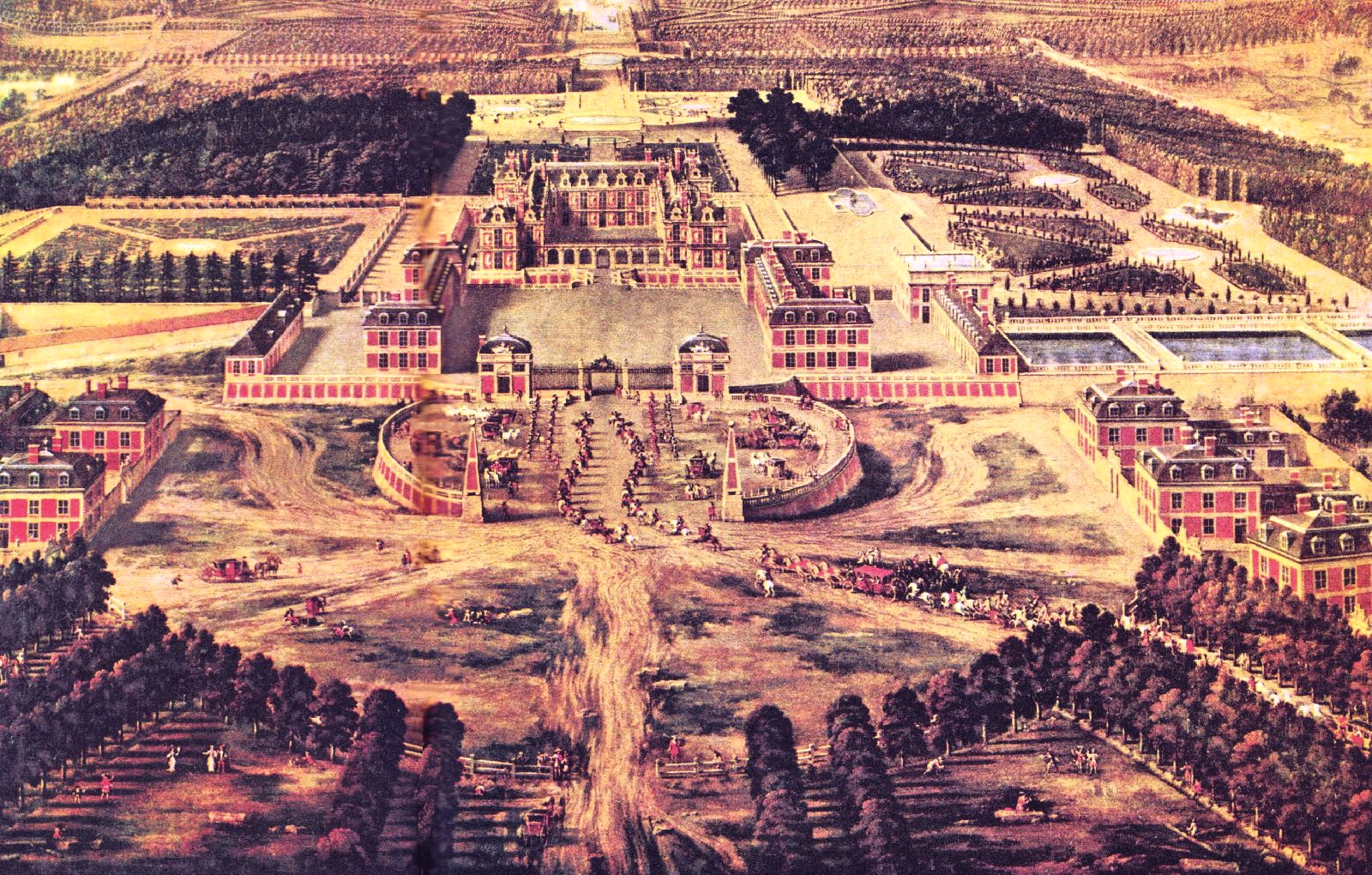
Versailles Palace in the
period just prior to the French Revolution
Musee de Versailles -
Giraudon
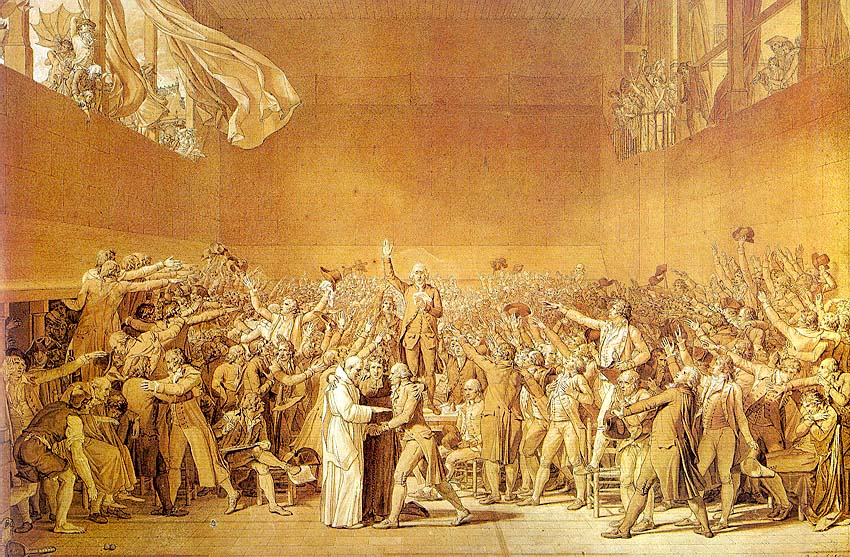 Sketch by Jacques-Louis David
of the Tennis Court Oath (French: serment de jeu de
paume)
Sketch by Jacques-Louis David
of the Tennis Court Oath (French: serment de jeu de
paume)
| A pledge signed by 567 of the 577
members of the French Third Estate (and a few members of the Second Estate)
on June 20, 1789 at a tennis court near the Palace of Versailles.
They had regrouped themselves as the National Assembly after being dismissed
from the gathering of the Estates-General -- and swore that they would
not leave until a new constitution was granted by the King (the artist Jacques-Louis David later
became a deputy in the National Convention in 1792).
|
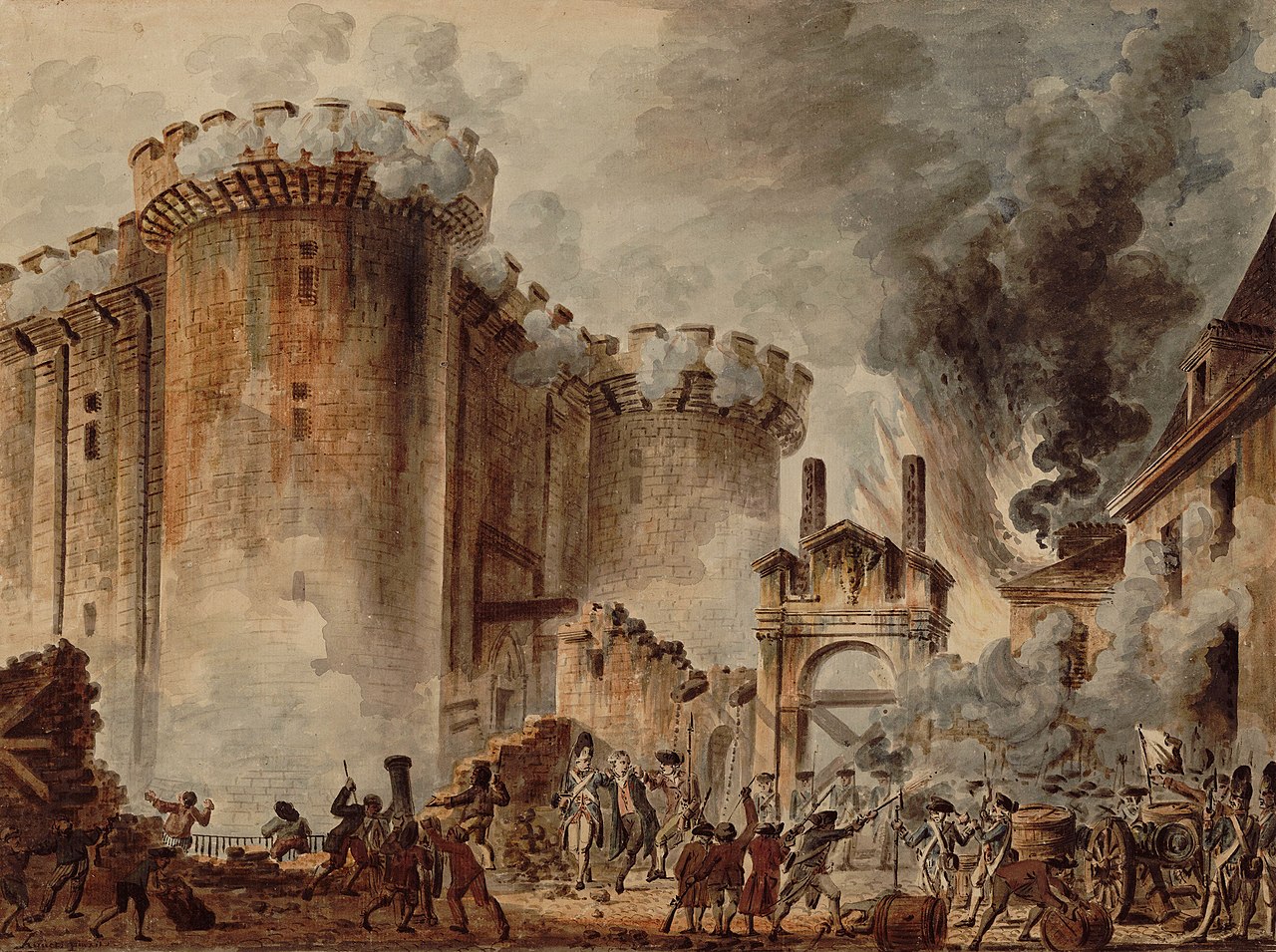
Jean-Pierre Houël (1735-1813)
- Prise de la Bastille ("The Storming of the Bastille")
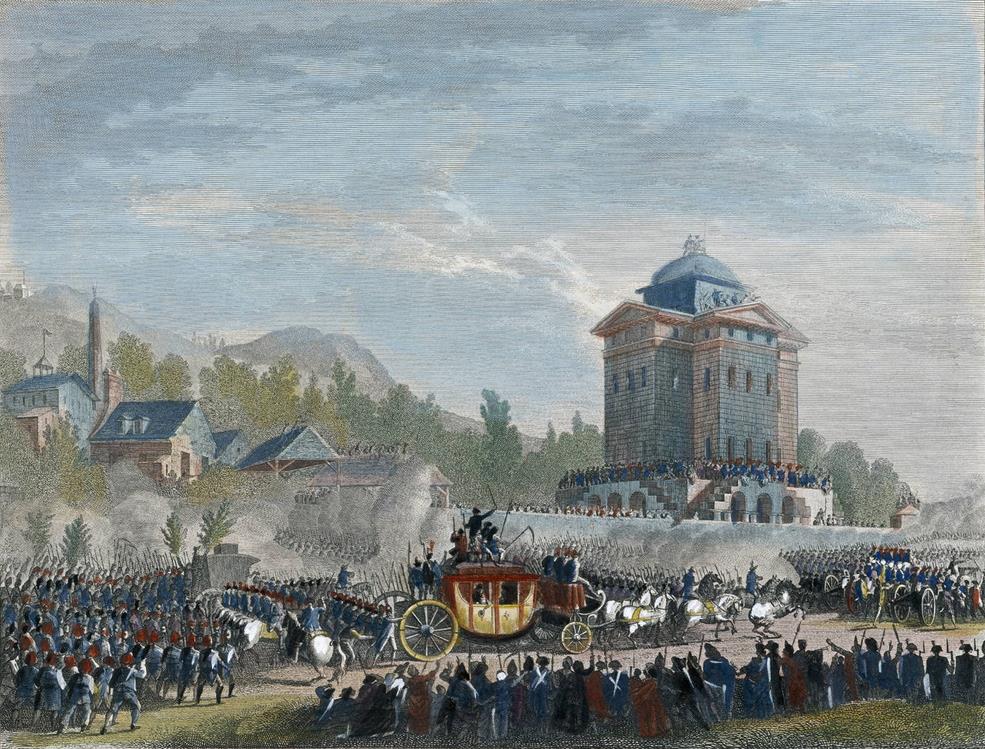
The Return of French King
Louis 16 to Paris - June 25, 1791 - colored copperplate by Jean
Duplessi-Bertaux after a drawing of Jean-Louis Prieur
|
The insurrection
The Assembly now seemed to be given over to increasingly radical voices
calling for the King's abdication. At the same time
anti-Revolutionary sentiment seemed to be spreading in the conservative
(and still quite pro-Catholic) countryside ... especially the Vendée
... adding to the nervousness of Paris. Finally in August of 1792
a bloody Paris insurrection exploded and the indecisive King lost the
last of his powers ... and was arrested and imprisoned. At this
point the Assembly (heavily represented by lawyers) also lost its
powers, as Paris came under the control of local committees made up of
a variety of radicals, some of even a working-class background.
|
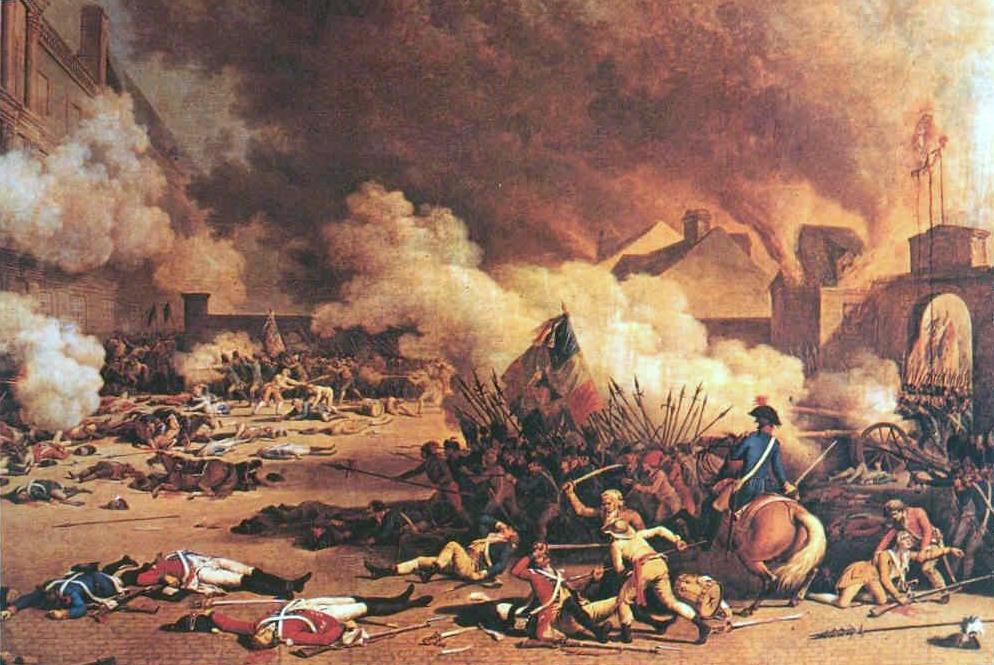
The Storming of the Tuileries
Palace by members of the Paris Commune, August 10, 1792 -
by Jacques Bertaux
Palace of Versailles
|
The Convention
Elections were then called (with all adult male Frenchmen voting) to
send representatives to a new constitutional Convention. When it
met in September it decreed the end to the monarchy, the beginning of
the French (First) Republic, and a new non-Christian calendar beginning
at year 1 (1792).
The King is guillotined
The
Girondins, led by the more pragmatic Georges Danton, were less radical
than the Jacobins. The Girondins were less interested in bringing
the King to trial than in keeping the Paris Commune from totally
dominating all aspects of the French Revolution. The Jacobins, led by
the Idealist Maximilien Robespierre – and which interestingly included
in their ranks a number of noblemen, including even the King's cousin
Louis Philippe – reflecting Paris radicalism, were in favor of the
King's death. A vote in early 1793 on the matter split the
Convention, with the Jacobins (and some Girondins) gaining a small
majority. Thus the King was executed at the guillotine like a
mere commoner three days later.
It was shocking. A king had been executed by his own people. But
this merely marked the beginning of the Republic's struggle to find
some semblance of political structure. With the King out of the
way, Girondins and Jacobins turned on each other. Robespierre's
Jacobins accused Danton's Girondins of conspiracy to betray the
Revolution ... with every attempt to answer the accusations making the
Girondins look all the more guilty. The Paris mob now was at the
door, demanding the expulsion of the traitors (the Girondins).
Twenty-nine Girondin leaders were arrested and carried off. The
Girondin party was devastated (summer 1793).
.
|
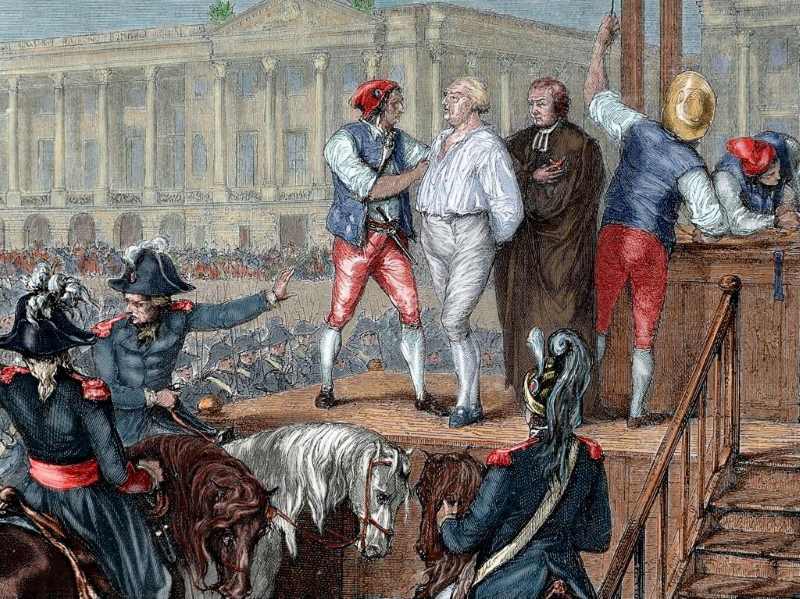
The execution of Louis XVI,
January 21, 1793
The Republican Constitution (1793)
The way was clear now for the finishing of the new Constitution.
The preamble was even more utopian than the earlier Declaration of
Human Rights.
Not only was freedom of speech and press and equality of all before the
law guaranteed, the Declaration proclaimed that all French had the
right to education, to work, to receive public assistance, even to rise
in rebellion if the government failed to deliver on these rights.
Even though the Constitution provided for a Legislative Assembly, since
the days of the Convention the real work had been performed through a
series of committees, the most important of which was the Committee of
General Security (searched for enemies of the Revolution to bring to
"justice"). With the creation of the Republic that function was
then taken over by the Committee of Public Safety.
|
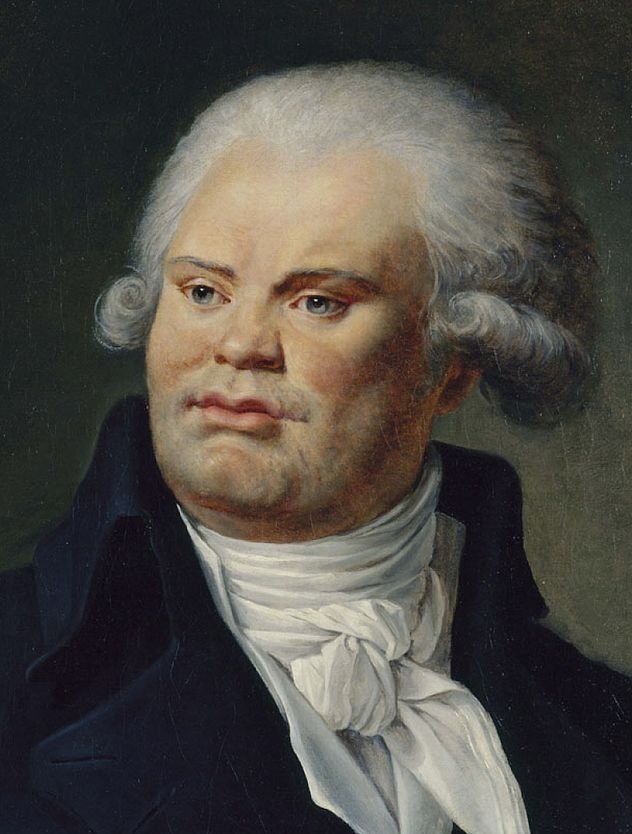
Georges-Jacques
Danton
| All executive power was conferred
upon a Committee of Public Safety (6 April 1793) made up of 9 members,
of which Danton was one. However he himself was executed April 5, 1794.
|
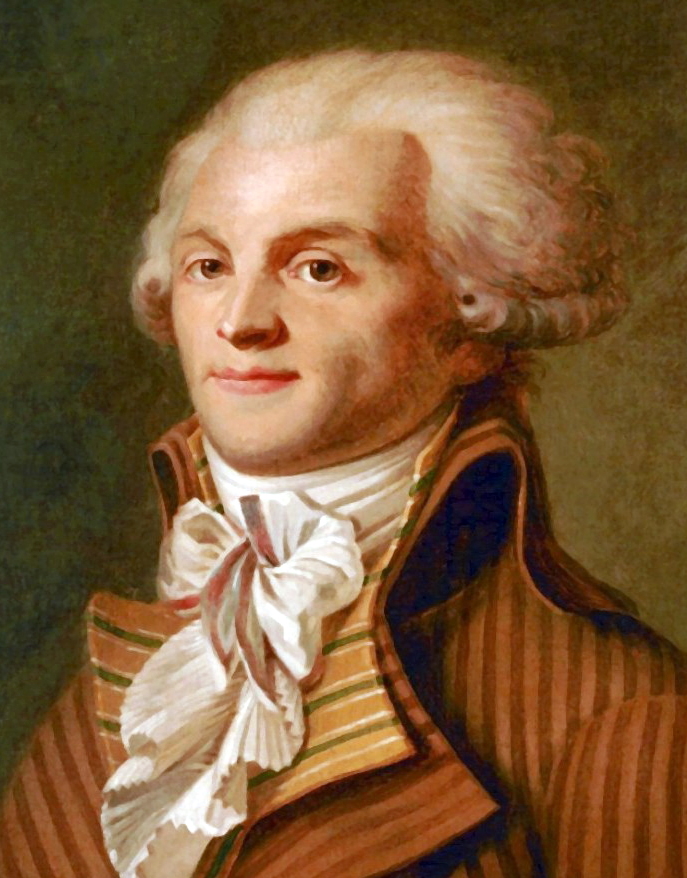 Maximilien Robespierre,
1758-1794
Maximilien Robespierre,
1758-1794
| It was Robespierre's belief that
political terror and virtue were of necessity inseparable. "If virtue
be the spring of a popular government in times of peace, the spring of
that government during a revolution is virtue combined with terror: virtue,
without which terror is destructive; terror, without which virtue is impotent.
Terror is only justice prompt, severe and inflexible; it is then an emanation
of virtue; it is less a distinct principle than a natural consequence of
the general principle of democracy, applied to the most pressing wants
of the country. … The government in a revolution is the despotism of liberty
against tyranny." "On the Principles of Political Morality"
(1794).
|
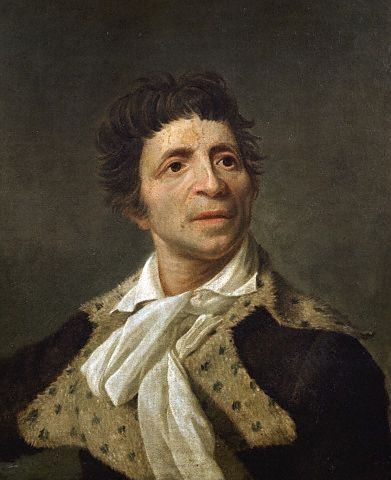 Jean-Paul
Marat
Jean-Paul
Marat
| A radical journalist, publisher
of L'Ami du peuple, who strongly supported of the September 1792
massacres and, in compiling his "dealth lists," was a strong encourager
of what was to eventually become the Reign of Terror ... though he himself
was stabbed to death in his bathtub by self-proclaimed Girondist Charlotte
Corday on July 13, 1793, just prior to the startup of the Terror.
|
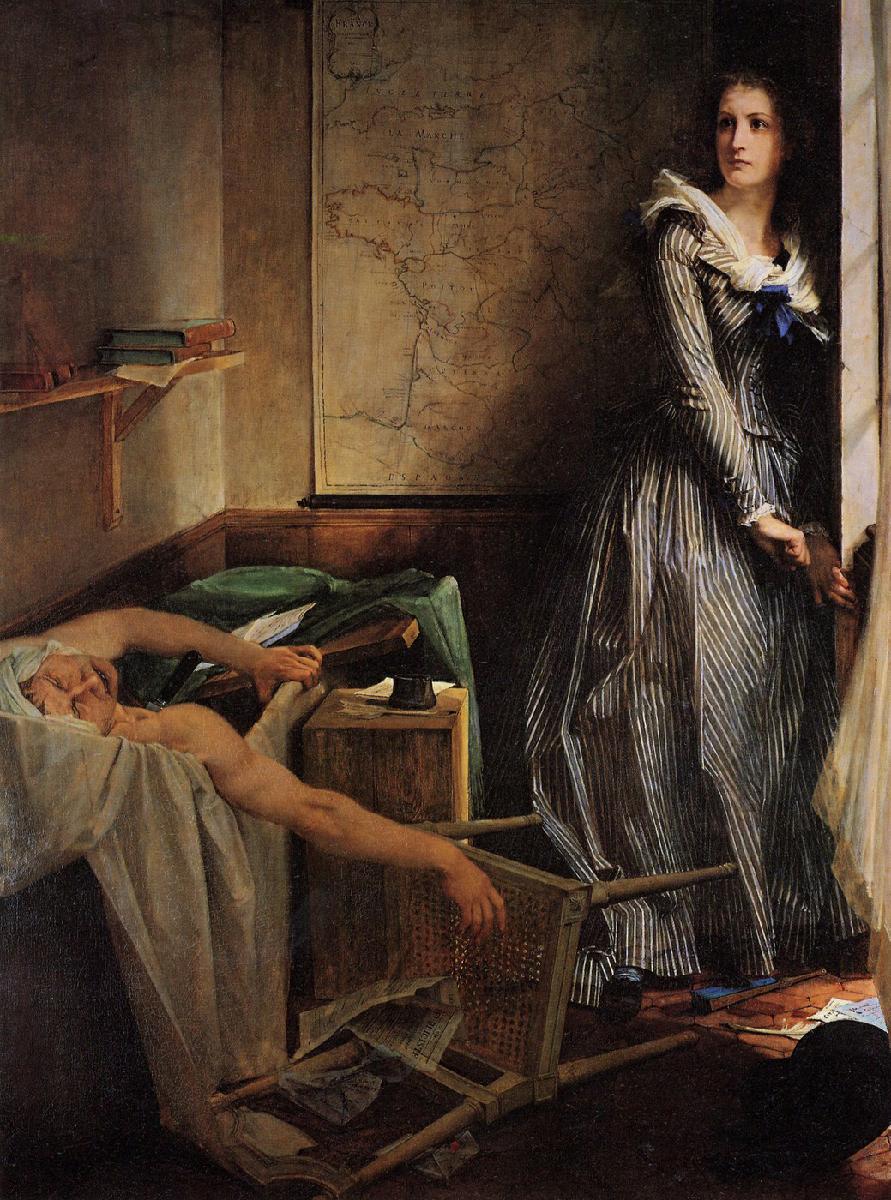 Charlotte Corday and Jean-Paul
Marat Charlotte Corday and Jean-Paul
Marat
| Repulsed by the massacre of September
1792 that Marat had encouraged, she came to his house ostensibly to report
on a Girondist plot and give Marat names for his death list. But
she stabbed him -- and was quickly apprehended and guillotined several
days later. This became a major contributing event to the Reign of
Terror as the Jacobins began their massacre of Girondists and other "enemies"
of the Revolution.
|
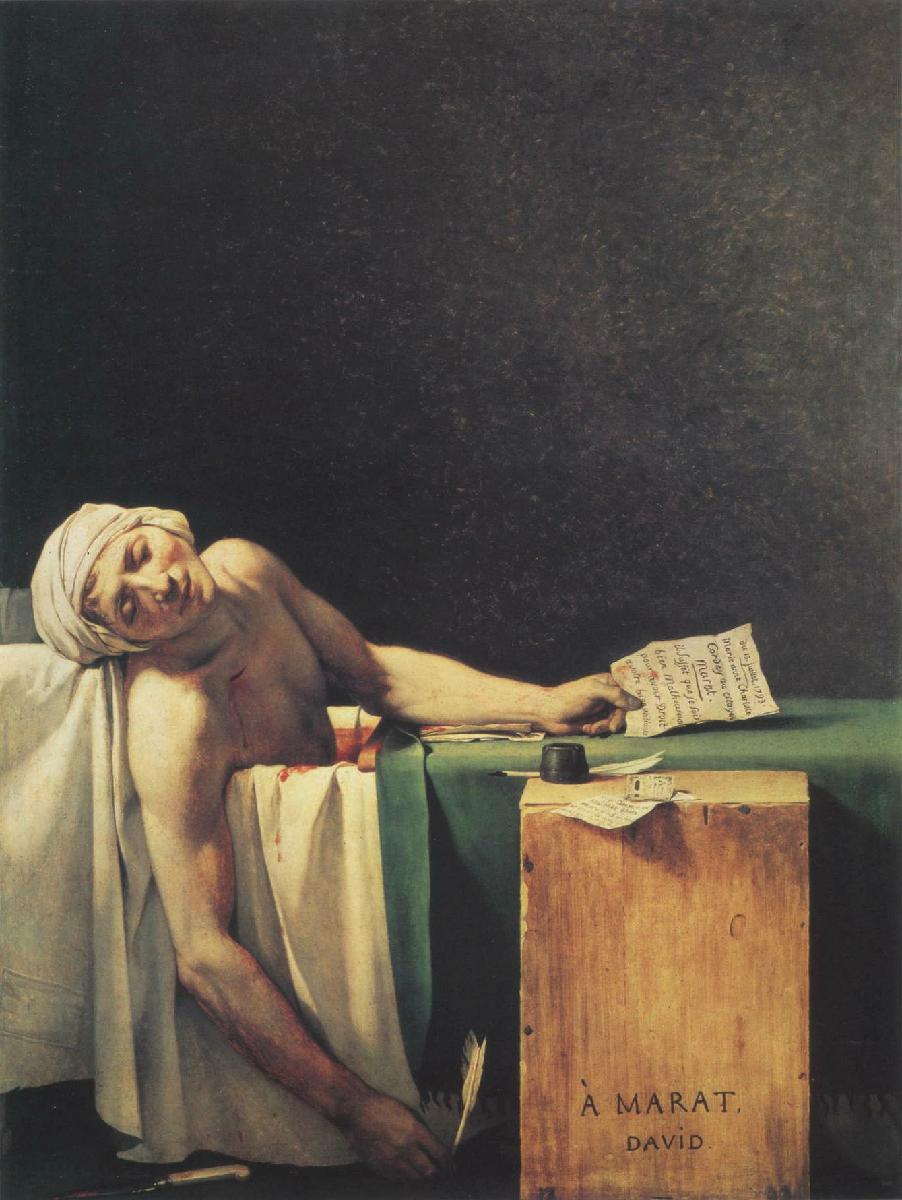 Jacques-Louis David – Death
of Marat (1793) oil on canvas
Jacques-Louis David – Death
of Marat (1793) oil on canvas
Brussels, Musées Royaux
des Beaux-Arts
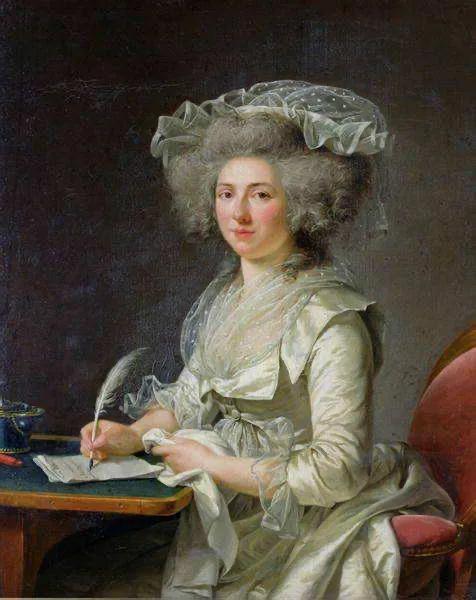
Marie-Jeanne Roland de la
Platière (1754 - 1793) by Adelaide Labille-Guiard - 1787
| Her salon in
Paris had earlier become the rendezvous of Brissot, Pétion, Robespierre and other leaders
of the Revolution; but when she and her husband became critiques of the
cruel excesses of the Terror, she fell from favor with the radical Montagnards
or Jacobins (Danton and Robespierre). She was executed November 8,
1793.
|
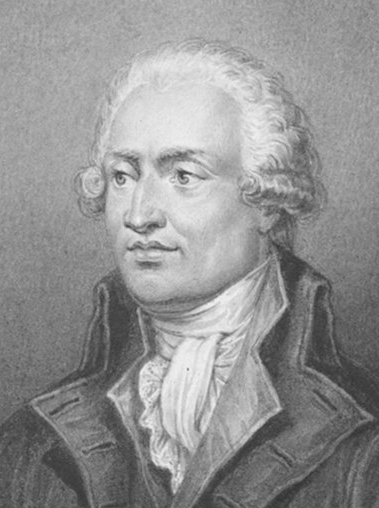
Marie Jean Antoine Nicolas
de Caritat, marquis de Condorcet - French mathematician and
philosopher
|
Condorcet wrote Esquisse d'un tableau historique des progrès de
l'esprit humain
while in hiding (October
1793 - March 1794) from the Jacobins. He was arrested and died of
poisoning in prison.
His book was published the
following year by his wife.
|
|
The "Reign of Terror" (1793-1794)
In October, trials of the enemies of the Revolution began in
earnest. The Queen was guillotined, then much of the Girondin
leadership as well. As arrests began to become more widely
sweeping through French society, the Committee of Public Safety, now
headed by Robespierre, became more absolute in its control.
Indeed, by the end of 1793 Robespierre was the virtual dictator of
Republican France.
Not only did the Paris guillotine work overtime to kill thousands of
enemies of the Revolution, the French army found itself busy in the
French countryside putting down anti-Revolutionary rebellions.
Worst was in the Vendée where the army conducted something akin to
genocide in bringing the people of that province into submission.
Estimates of those who died in the Vendée range from a quarter to over
a half of the population of 800,000.
By the next summer (1794) the Revolutionary Tribunal was at its most
active in trying and executing the Republic's enemies at home.
The Jacobins were persuaded that only terror could shake the people's
feudal Catholic mindset and free them to rise fully to the rule of
human "Reason."
Indeed, the Cult of Reason was intentionally set forth as the new
state-sponsored atheistic worldview (or religion), designed to replace
France's long-standing Catholic foundations. As such, "Reason"
was required of all those true to French Republicanism. Thus it
was that in November of 1793, at the height of the Reign of Terror,
churches across France were forcibly transformed into Temples of
Reason, including most importantly Paris's Notre Dame Cathedral – where
a huge procession followed a newly appointed "Goddess of Reason" and
her white-clad girls into the cathedral and placed her on the altar to
be worshiped. This worship of "Human Reason" in turn merely
stirred more deeply the radical instincts of those most dedicated to
the "social cleansing" taking place in Paris and across much of France. |
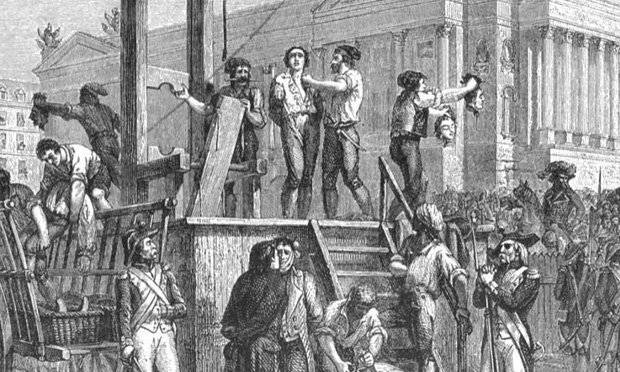
The Reign of Terror as the French revolutionaries turn on each other - 1793-1794
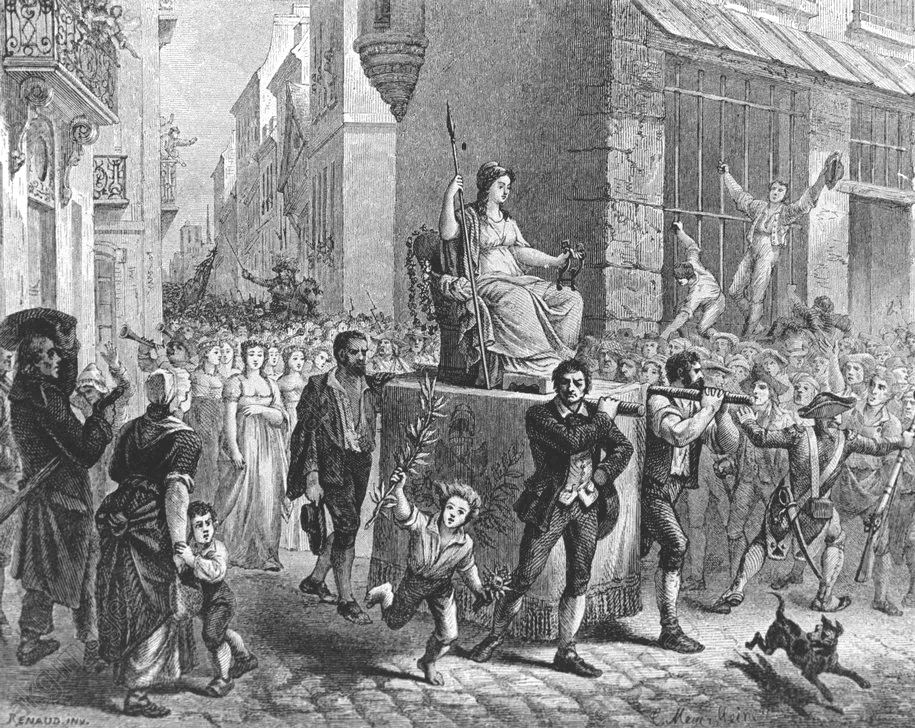 The Goddess
"Reason" is carried to the Notre Dame Cathedral - 10 November, 1793
The Goddess
"Reason" is carried to the Notre Dame Cathedral - 10 November, 1793
But
the public mood itself was now beginning to turn against all this
social terror, a terror that Robespierre praised as the hallmark of
true Republican Revolution. When in July (1794) 16 nuns went
singing to the Paris guillotine for the crime of choosing to remain
nuns, things took a turn for Robespierre. Political jealousy
within the Committee of Public Safety also motivated his arrest (end of
July) ... and execution the next day.
With the downfall of Robespierre (and other Jacobin leaders) the
Committee of Public Safety lost influence ... and eventually the use of
the word "terror" itself became a crime. The Thermidorian
Reaction had set it.
|
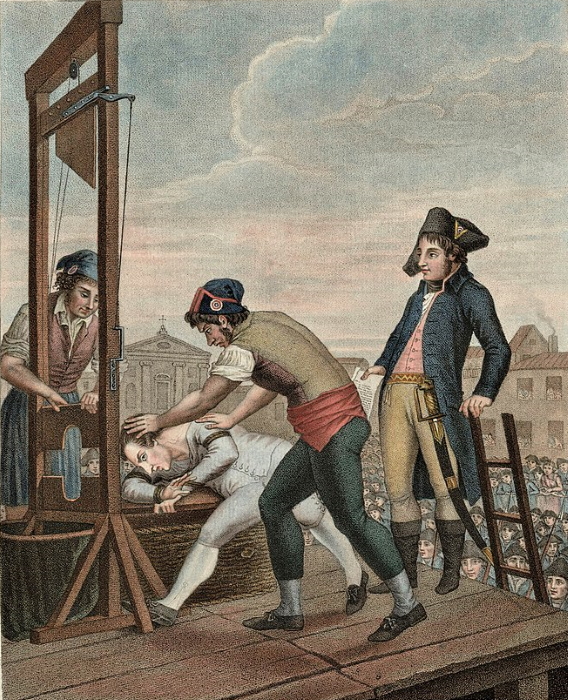
Robespierre is himself executed - July 27, 1794
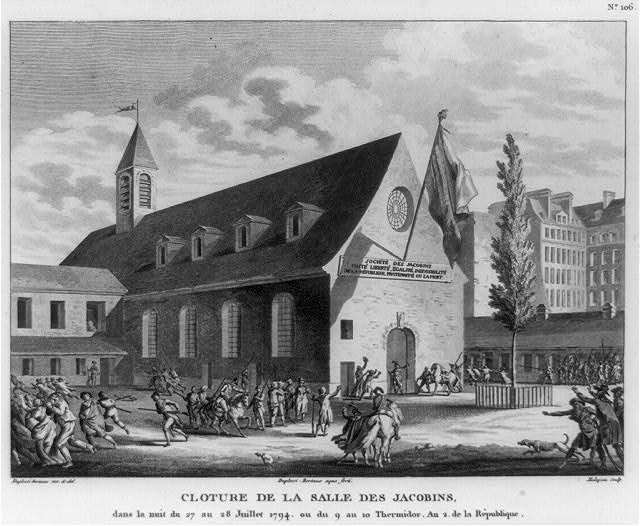 Closing of the Jacobin Club,
during the night of 27-28 July 1794, or 9-10 Thermidor, year
2 of the Republic
Closing of the Jacobin Club,
during the night of 27-28 July 1794, or 9-10 Thermidor, year
2 of the Republic
Print by Claude Nicolas
Malapeau (1755-1803)
after an etching by Jean Duplessi-Bertaux
(1747-1819)
|
The Directory (1795-1799)
Surviving Girondists now took charge, wrote a new constitution and put
it before the people, who approved it overwhelmingly. The new
constitution provided for a bi-cameral legislature and a five-man
executive committee, termed the Directory. Unfortunately for
France this executive scheme proved largely unworkable (in part also
because of the poor level of political talent among the
directors). The Directory tried to step back from the excesses of
the Revolution ... and was able to do so only because politically the
country was exhausted. But these were shaky foundations.
Besides, the French government still had not solved the problem of an
empty state treasury ... and the economy in general was in very bad
shape. And corruption was a problem the new government seemed
unable to overcome.
The French army
The major difference between the French army and those of its enemies
was that the French army, by the end of 1792, was made up of masses of
conscripted or drafted commoners ... literally hundreds of thousands of
new "citizens" called on to defend their Republic ... whereas the
armies of their adversaries tended to be paid soldiers, forming smaller
armies limited in size by the size of the treasury of their royal
employers. Also the French developed the use of different
services in tactical support of each other, particularly the use of
artillery in support of the infantry (and of course cavalry for the
same purpose). Particularly skillful in this regard was a young
artillery officer, Napoleon Bonaparte ... who would soon distinguish
himself as an excellent tactician.
Advance against other European powers
The French found some degree of sympathy for the Republican cause in
other parts of Europe ... in particular among the Dutch, who in 1795
set up (with the help of the French army) a new Batavian Republic –
something of a sister republic of France's. Also Prussia turned
the west bank of the Rhine over to France ... in order to concentrate
on its war with Poland. Spain was pacified (1795). Then
Napoleon advanced into northern Italy, defeating both Italian and
Austrian efforts to block his advance (1796-1797). From Italy he
headed north to attack Austria, which soon called for a peace that
recognized the various expansions of the French borders (1797).
Napoleon was a fast-rising name in France. |
|
Rise to prominence
Napoleon had first distinguished himself by firing his cannons on
royalist uprising in Paris (1795) attempting to overthrow the new
Directory. This earned him (age 26) his appointment by the
Directory as General of the Army of Italy... which he honored with his
subsequent victories in Italy (against principally the Austrians and
the northern Italian states they dominated). As a national hero
he was able to cultivate political supporters within the Directory in
Paris ... making the Directory increasingly dependent on him personally.
The Egyptian campaign
Finding that the French navy was not ready for a direct assault on
Britain, Napoleon decided to take the war to the Middle East in order
to seize for France Britain's vital trade route to India. At
first (1798) he scored an easy victory against the Mamluk's Egyptian
Army. But Lord Nelson's British fleet soon showed up, destroyed
Napoleon's French fleet, and ended any idea of France controlling the
vital trade route to India. But Napoleon pushed on from Egypt to
Syria anyway (early 1799) ... into a world of hunger, disease (the
plague) and brutality – devastating his troops as well as the local
population.
Consul (or dictator) 1799
Hearing of mounting political confusion (and growing unpopularity of
the Directory) back in France – and finding no further opportunities
for glory in the Middle East – Napoleon decided to return to
Paris. Upon his arrival (oddly enough, to a hero's welcome) he
shut down the Council of Five Hundred and the Directorate, and named
himself Consul of France ... confirmed in a new French constitution
which in turn received in a national plebiscite almost total approval
(a rather suspicious tally of 3 million in favor, only 1500 opposed).
Emperor (1804)
There were numerous attempts to unseat, even at one point to
assassinate, Napoleon ... and he used one such incident to move (with
another highly approving plebiscite) to make himself "Emperor of
France" ... with the rights of succession to the title on the part of
any of his personal heirs. And so with the Pope in attendance,
Napoleon had himself crowned French Emperor in December of 1804.
He thus re-established in France the ancient principle of monarchy,
with himself as an imperial monarch. The First French Empire was
thus born.
Reforms
In so many ways Napoleon brought France into modern culture.
Besides modern military strategies, he introduced a new legal code –
one which would outlive him as a model followed not only in France but
widely in Europe (particularly in those countries where Bonapartist
rule once held sway) and even in many other parts of the world. It
replaced the complex mix of feudal customs with precise written rules
applied equally to all citizens regardless of social rank. He
reorganized the administration of France, ending its confusing maze of
feudal districts, instead dividing France into 80 départements of more
or less equal size, governed by prefects which he himself appointed,
thus tightening Paris's control over the rest of France ... and giving
it a truly national or French identity in replacement of the regional
loyalties characteristic of traditional France. He freed up the
sale or exchange of property ... and opened the trades or professions
to anyone trained for the work – and not just to those born to specific
guild families.
He extended to Catholic France, brutalized by the Revolution, his
Concordat of 1801 – restoring the Church and its priesthood to its
place of religious privilege ... though he did not return to the
Church properties seized during the Revolution. On the other
hand, he shut down the Catholic Inquisition and ended the restrictions
against Protestants and Jews. He liberalized France's divorce
laws. He also pushed for the development of more secular public
secondary schools (lycées). And he started France thinking in
metric terms (though full conversion to the metric system would not
take place until the mid-1800s).
Wars and more wars
However it is in the conduct of his many wars that Napoleon is largely
remembered. He was hugely successful ... most of the time.
In 1800 he pulled success out of a near disaster at Marengo (Italy) and
won overwhelmingly at Hohenlinden (Germany) against the Austrians.
In 1805, with the birth of a new round of war by a new coalition (the
"Third") of Britain, Sweden, Russia, and Austria, things got off to a
poor start for Napoleon when his own French-Spanish naval coalition was
defeated by the English at Cape Finisterre (Spain), ending his hopes
for an invasion of England by his Grande Armée. He then turned
his army east towards the Austrians, crushing them at Ulm. But in
the meantime his combined French-Spanish navies were again defeated –
decisively – at Trafalgar (Spain) by the English under Lord
Nelson. But the French were able to capture Austria's capital
Vienna ... and then move on to destroy a combined Austrian-Russian army
at Austerlitz before the end of the year. The resulting peace saw
Napoleon remaking the face of central Europe, putting to an end the
Holy Roman Empire and combining the hundreds of small but
semi-independent German states into a Confederation of the Rhine.7
Napoleon was at the height of his glory at this point.
In 1806 he marched against the ("Fourth") coalition of Prussia and
Russia, crushing Prussia at Jena and Auerstedt. He then turned to
face Russia, fighting to a stand-off at Eylau ... and then to an
overwhelming defeat of Russia at Friedland. The Prussians lost
half of their territory in Germany when Napoleon created the Kingdom of
Westphalia and placed his brother Jerôme over it as king. With
the Russian Tsar, Napoleon was kinder in his victory, hoping to create
a friendship that could serve French interests in East Europe.
He now focused his thoughts on Britain, attempting to tighten his
"Continental System" of a blocking of all commercial relations with
Britain on the European Continent in an effort to cripple the British
economy and thus force Britain to finally fall under his rule.
But his effort to discipline Portugal (which had not been honoring the
boycott) drew him into the Iberian Peninsula of Spain and Portugal ...
where Spanish sensitivities to French intervention in the region's
political affairs drew him into a draining round of local fights with
Spanish guerrilla bands. His appointing his brother Joseph as
King of Spain (1808) in the hope of getting on top of the situation
there only made matters worse. He was forced to position
permanently a huge portion of his army to hold things together in Spain
... while he faced continuing threats to France elsewhere.
Indeed, the British under Wellington would take advantage of Napoleon's
troubles elsewhere by sending their own troops to Spain and gradually
ending French control there.
At this point (1809) Austria (part of the "Fifth" Coalition) re-entered
the fight against France, actually defeating the French in a battle at
Aspern ... but then being devastated by the French in a second
engagement at Wagram. Politically this resulted in a huge loss
for Austria. But at least peace would reign in Europe for the
next few years.
But the Russian Tsar was being pressured by his nobles to join with
Britain in an offensive against the French ... in the hope of retaking
Poland. Napoleon heard of these plans and instead decided to take
the initiative. Thus in 1812 he headed a French army of nearly
half a million troops into Russia. A big mistake! The
Russians fell back instead of offering direct resistance to the
invaders (except at bloody Borodino) destroying their own crops and
animals to keep the French from securing food for their troops.
Napoleon made it all the way to Moscow just as the harsh Russian winter
set in ... finding nothing in this abandoned and burned-out city to
mark this as a victory. The Russians simply would not
surrender. After five weeks of pointless occupation, and with
political problems brewing back in Paris, Napoleon decided to
withdraw. The retreat was so ruinous that less than one-tenth of
his army made it back alive to France.
Encouraged by Napoleon's failure in Russia a Sixth Coalition was formed
against him in 1813. Once again Napoleon, with a rebuilt army,
humiliated the Coalition at Dresden. But the numbers were against
him, and a few months later at Leipzig, Napoleon's army was
crushed. Humiliating terms were put before Napoleon, which he
delayed too long in accepting. Napoleon attempted to hold off
with a number of smaller engagements ... but he was running out of
soldiers. Finally the French Sénat took action in deposing
him. Napoleon now had no choice but to accept exile to the Island
of Elba (off the Italian coast) which he was allowed to continue to
rule as "emperor."
The victorious allies then reinstated in France the Bourbon monarchy
under Louis XVIII. Their hope was to put this whole 25-year
nightmare of the French Revolution and the Napoleonic Empire behind
them and move back to business as usual. That was not to
be.
The Battle of Waterloo (1815)
In early 1815 news reached the allied delegates to the Congress of
Vienna that Napoleon had escaped from Elba and was gathering a new
French army in order to restore his French Empire. Britain,
Russia, Austria and Prussia were determined to put to an end forever
Napoleon's efforts to undo their work. By the summer, Napoleon
was ready to act against this new coalition, moving into (today's)
Belgium where outside the village of Waterloo he met the combined army
of Britain (under Wellington) and Prussia (under Blücher) ... and went
down in defeat. This time he was exiled to a small island (St.
Helena) in the middle of the Atlantic Ocean where he would remain until
his death six years later.
 For more (much more) on Napoleon and the Napoleonic Wars For more (much more) on Napoleon and the Napoleonic Wars
7He
had also promoted himself earlier that year from the position as
President of the Italian Republic (since 1802), to now being King of
Italy.
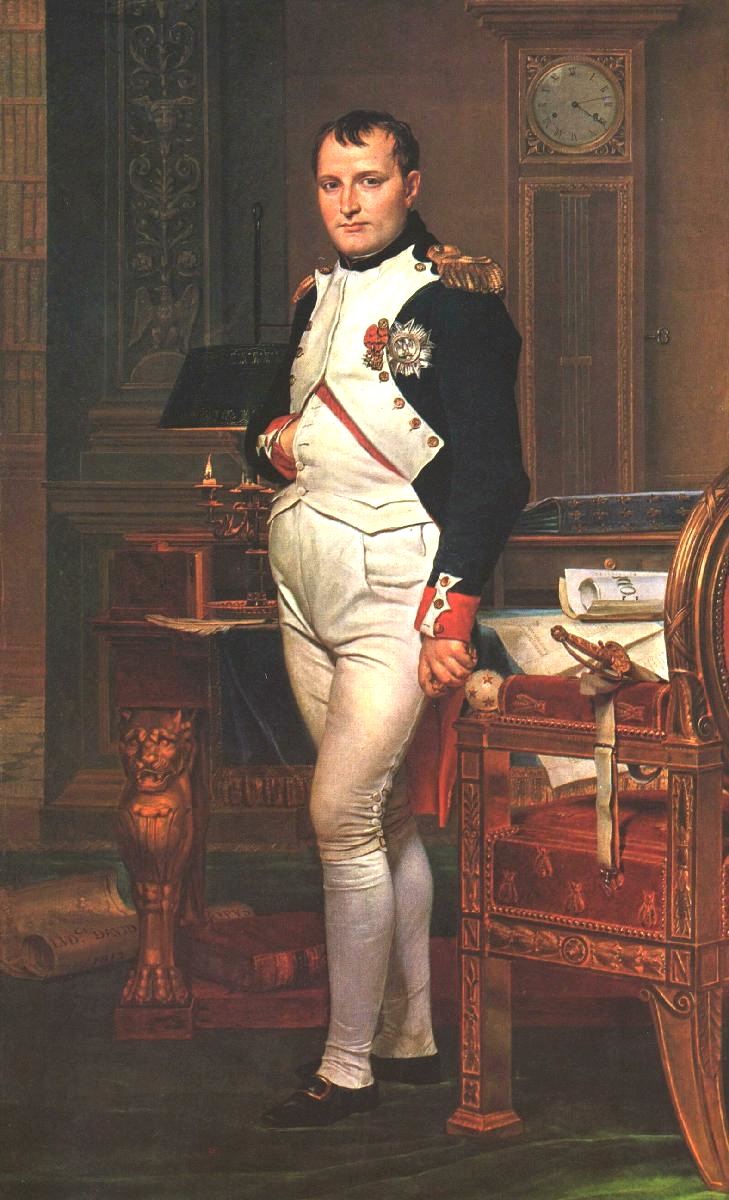
The Emperor Napoleon Bonaparte (reigned 1799-1815) finally settles France down ... before spinning the country outward in a campaign of European conquest
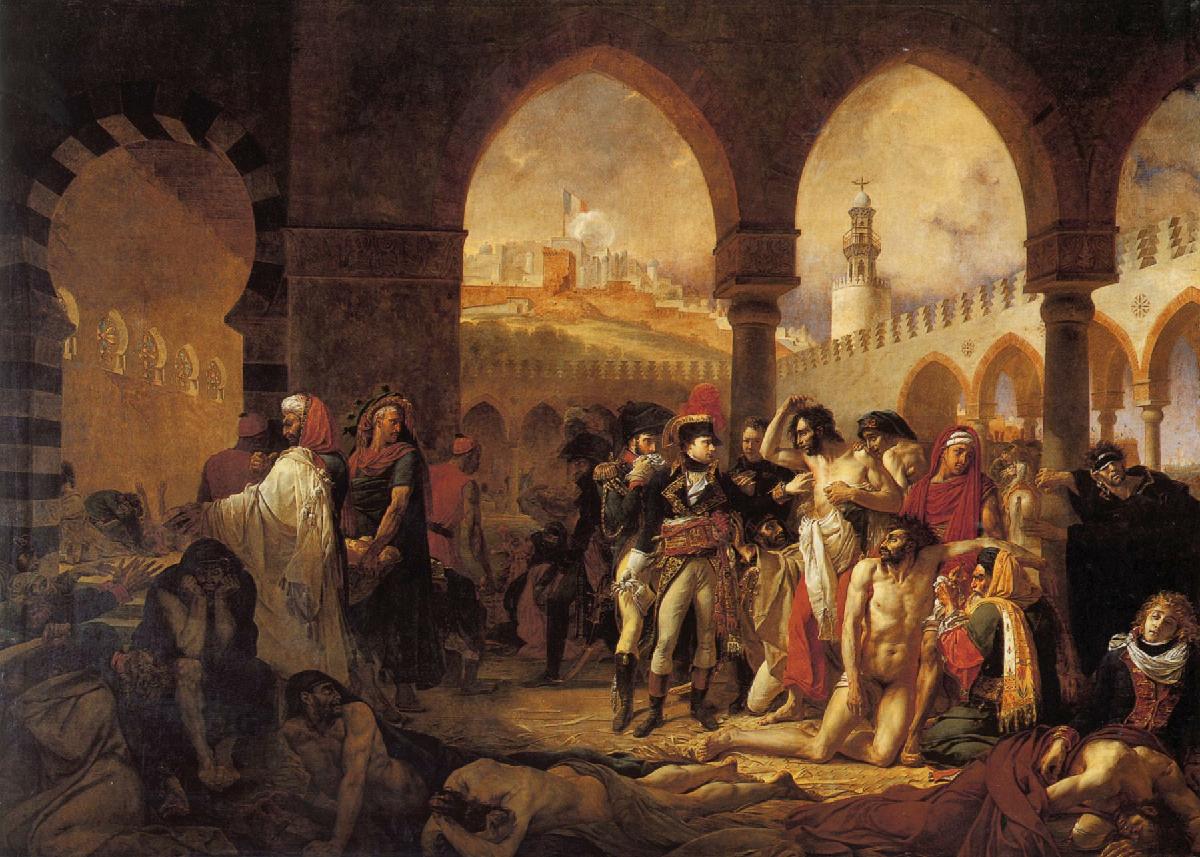
Napoleon at the Pesthouse in Jaffa
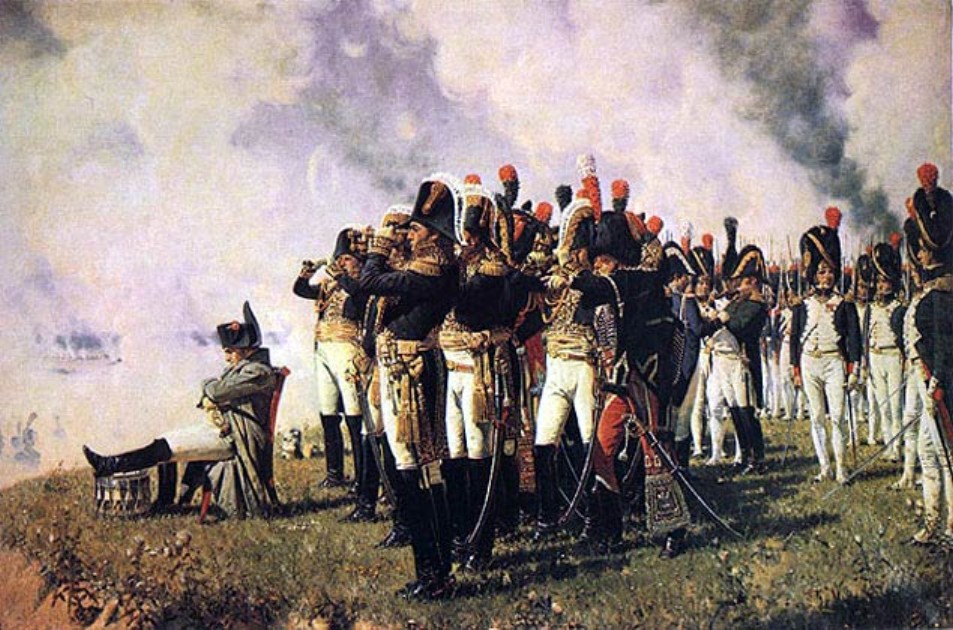
Napoleon on Borodino Heights
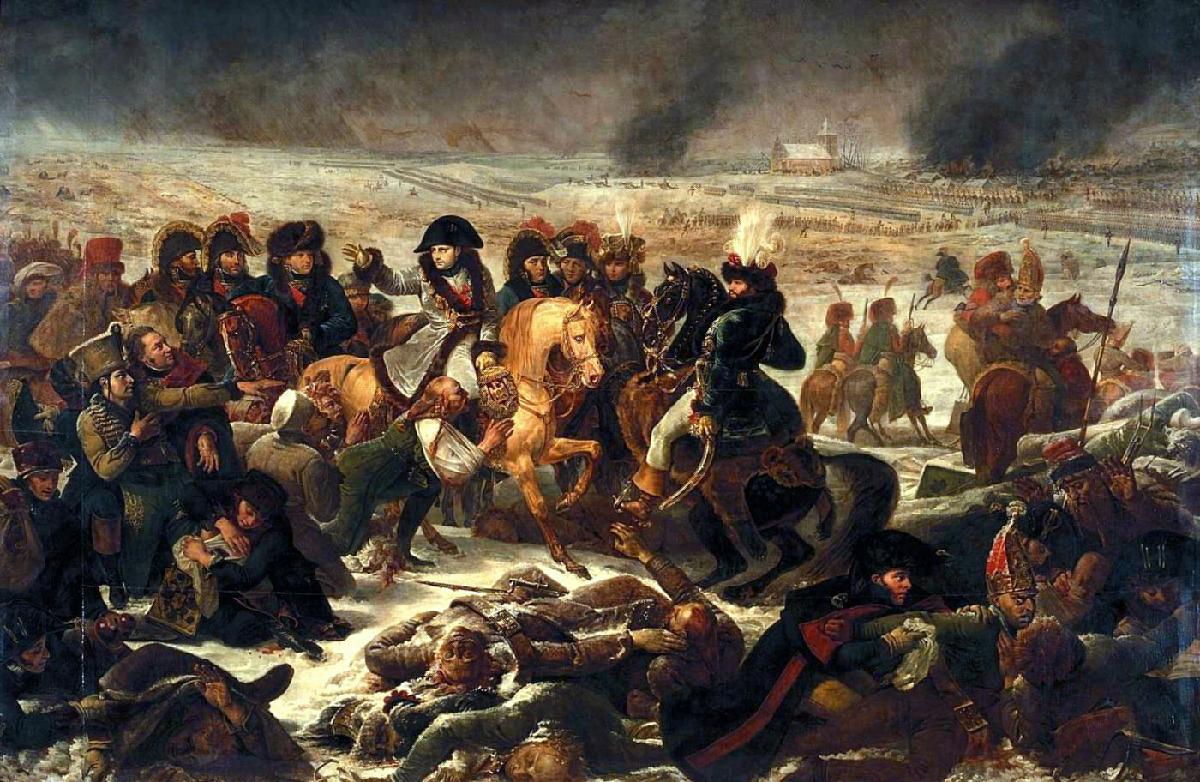
Napoleon on the Battlefield of Eylau
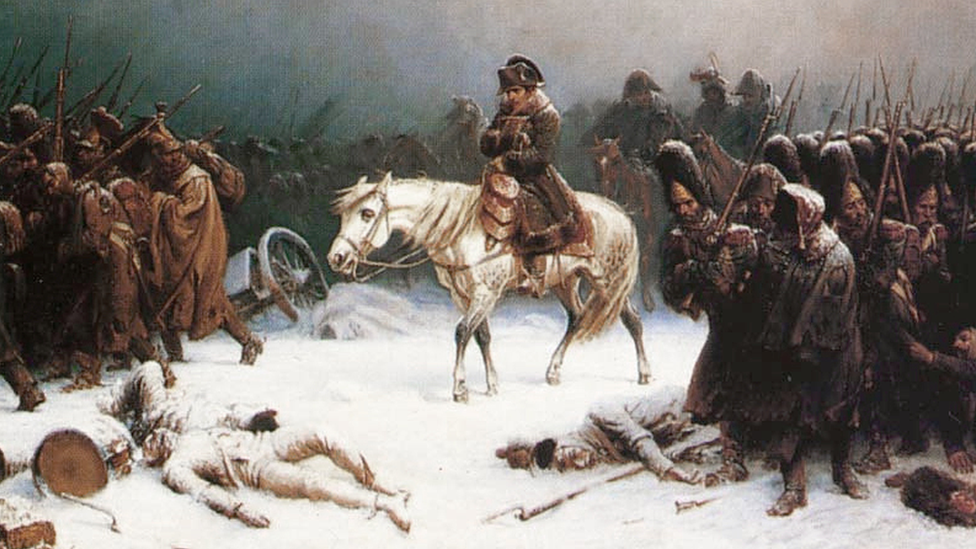
Napoleon's retreat from Moscow - 1812
THE AMERICAN AND FRENCH REVOLUTIONS COMPARED |
|
The American Revolution
Actually the American Revolution was no revolution at all, socially and
culturally speaking. It was revolutionary only in the sense of a
people rising up against their feudal king and succeeding in the short
span of a half-dozen years in securing their full independence as a
people. But America before the war and America after the war was
pretty much the same. 150 years of colonial self-rule since the
early 1600s had taught the Americans how to take care of themselves –
from building their own communities of homes, barns, workshops, schools
and churches ... to defending themselves from their local enemies, the
Indians (and occasionally the Spanish and the French). The
American "Revolution" occurred simply because an English king decided
to take away the personal liberties to which these Americans were well
accustomed. Their "Revolution" merely confirmed those liberties
... not create them as if they were new.
Even the Constitution they drew up in 1787 was a
rather limited political document, more a treaty among thirteen
independent states providing for cooperation so as to keep them from
splitting into little contending states, vulnerable to the continuing
imperial designs of the great powers of Europe. The Constitution
did not provide for a "government" such as we think of today when we
think of an institution which governs over people. Government in
that sense remained a strictly state and local affair (except
occasionally in times of war) ... up until the mid-1960s when President
Johnson and his "Liberal"8 brain trust decided to build a "Great
Society" which would govern from Washington, D.C. on virtually every
matter affecting American life. But that took nearly two
centuries to come into existence after the American "Revolution.'
The French Revolution / Napoleonic Empire
But what happened in France in follow-up to America's Revolution was
indeed truly "revolutionary" in every social-cultural respect.
The French Revolution killed the feudal system that had governed Europe
for a thousand years. And the Napoleonic Empire put in its place
a new system by which the masses of common people, not the select lords
and ladies, formed the foundation of European social power. The
French armed their people ... and in the process of fighting their own
wars gave real strength to the notion of the "people" – or (as this new
concept would develop through the 1800s) the "nation."
It was not just France that the Coalition powers of Britain, Austria,
Prussia, Russia, Spain and Sweden were fighting. It was their
Revolution they were trying to undo. They were quick to support
the French Bourbon monarchy that the French Revolution had nearly
decapitated.
In many ways Napoleon was one of them ... another
monarch. But he was a monarch who stood for the ideals of the
European Enlightenment. They were opposed to those ideals more
than the person of Napoleon ... though it was hard to differentiate the
two, Napoleon had so completely embraced personally Enlightenment
ideals.
For this reason, at first many of the European upper-middle class
(university educated) intellectuals were very supportive of the French
Revolution ... even at first of Napoleon. But in bringing the
idea of the sovereign "people" forward, the French Revolution also
raised the question of how to define those people. Though most of
the European aristocracy spoke French among themselves, the common
people spoke a multitude of languages ... which carried the songs, the
poetry, the stories, the dreams of the common people. And thus
local language became an important factor in defining "the
people."
In this way "nationalism" was born ... aided greatly by
the cultural arrogance of the occupying French governors and their
troops. Thus the idea of "German" and "Italian" began to take
place, to be joined by the already rising sense of being English (but
also Irish), Spanish, Portuguese, Russian, Swedish, Polish, etc.
Thus feudal Europe was entering a truly revolutionary social phase ...
one which would bring forth the pride of the European nation ... but
also the tragedy of the national bloodying of World War One (1914-1918)
... and the consequent undermining of European dominance throughout the
world.
8There
is considerable confusion over the term "Liberal" in today's America.
Originally the term meant liberal in the sense of being free ... in
reference to being liberated from the autocratic governments of Europe
which attempted to control all social life from above by higher
authority. Liberal meant full grass-roots self-government of the
people themselves. In America today it means almost the opposite
... where a Liberal is actually what Europeans would term a Socialist,
meaning someone who believes that society would work better (or more
"progressively") under the extensive guidance and control of high-level
government experts ... such as President Johnson proposed in the mid-1960s with his
"Great Society" – an idea which American "Liberals" have supported ever
since.

Go on to the next section: The "Modernizing" of the West
 Miles
H. Hodges Miles
H. Hodges
| | | | | |


 The American "Revolution"
The American "Revolution" The French Revolution (Mid-1770s to the
The French Revolution (Mid-1770s to the The American and French Revolutions
The American and French Revolutions





























